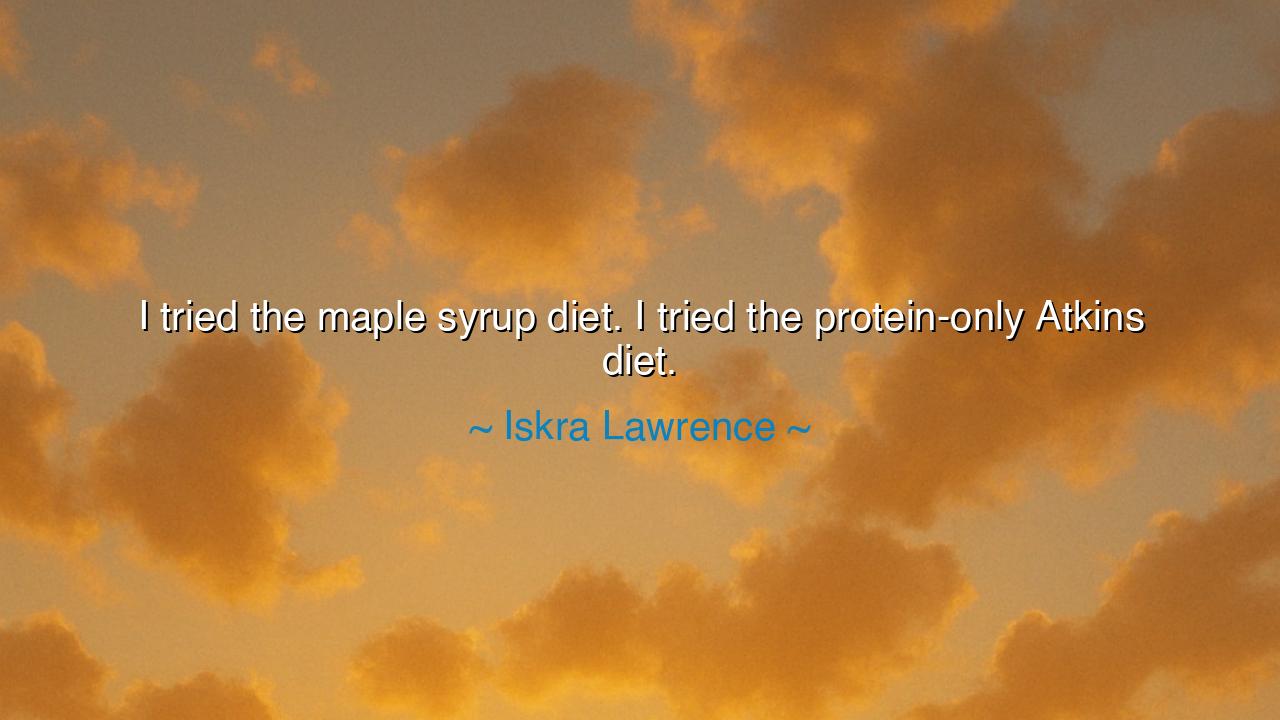
I tried the maple syrup diet. I tried the protein-only Atkins






"I tried the maple syrup diet. I tried the protein-only Atkins diet." These words, spoken by Iskra Lawrence, echo the timeless human experience of seeking the ideal path to health, only to find that the extremes often lead to more confusion than clarity. In our modern age, the quest for the perfect diet has become an almost mythic pursuit—like the ancient heroes who sought treasures and answers in faraway lands, we, too, embark on diets that promise quick fixes and transformation. But, as Lawrence’s words reflect, this search for the magical solution often reveals a deeper truth: that the answers we seek are not found in extreme, temporary measures, but in the ancient wisdom of balance and moderation.
In the time of the ancients, self-discipline and balance were viewed as pillars of health, longevity, and wisdom. The great Greek philosopher Socrates taught that the pursuit of wisdom and virtue required the tempering of desires—whether for food, drink, or other indulgences. Socrates, known for his deep introspection, believed that true strength arose not from extreme indulgence or restriction, but from the mastery of one’s own desires. Iskra Lawrence’s experience with extreme diets—like the maple syrup diet and the protein-only Atkins diet—speaks to the struggle that many face: the temptation of quick results and the promise of transformation, which ultimately leads to a deeper awareness that balance, not excess or deprivation, is the true path to well-being.
Consider the example of Pythagoras, the Greek philosopher and mathematician, who embraced a vegetarian diet. Pythagoras saw food as a tool to connect not just with the body, but with the divine—he believed that what we consume affects the clarity of the mind and the purity of the soul. His teachings emphasized the importance of a simple and balanced diet, one that nourished both the body and spirit. Pythagoras would have found the extreme nature of the Atkins diet or the maple syrup diet contrary to his philosophy, for these diets are based on the idea of limiting food groups rather than embracing a balanced, harmonious approach. Lawrence’s journey reflects the ancient understanding that the true path to well-being lies not in extremes, but in living in harmony with the body’s natural rhythms.
The Romans, too, understood the importance of balance in food and drink. While they were known for their lavish feasts, they also believed in the virtue of moderation and self-control. Cicero, a Roman philosopher, often wrote about how indulgence in food and drink weakened the body and mind. His philosophy aligned with the Roman belief that physical strength and mental clarity were cultivated through simple, wholesome nourishment. Much like Socrates and Pythagoras, Cicero believed that true vitality came from a measured approach to food—one that included moderation and restraint, not the extremes of an all-protein or all-sugar diet. Lawrence’s experience with these extreme diets would have resonated with Cicero’s teachings, as she likely discovered that such extremes offered temporary satisfaction but ultimately drained her body of its balance.
In ancient Chinese medicine, there is a similar belief that food should nourish the body in harmony with the elements and the seasons. The ancient Chinese understood that a diet rooted in balance—consisting of both yin and yang foods—was the path to true health. Just as Lawrence discovered that extreme diets left her feeling unsatisfied or imbalanced, the Chinese wisdom reminds us that food should be enjoyed in harmony with the body’s needs, not in extremes that disrupt our natural energies. The idea that food can serve as medicine is an ancient belief that echoes in Lawrence’s reflection—extreme diets, rather than healing, often lead to imbalance and discomfort.
The deeper lesson in Lawrence’s words is clear: while extreme diets may promise quick results, they are often unsustainable and, ultimately, lead to a deeper sense of imbalance. The true path to health lies not in the restriction or indulgence of certain foods, but in living with awareness and moderation. Just as the ancients emphasized the importance of balance in diet and lifestyle, we must adopt a holistic approach to our well-being. This means choosing foods that are nourishing, focusing on the quality of our nutrition rather than following the fleeting trends of extreme diets. It is a journey toward health that requires patience, mindful choices, and an understanding that the body thrives in balance.
In practical terms, Lawrence’s experience invites us to reconsider the diets we follow. Are we choosing extreme measures for temporary results, or are we committing to a lifestyle that promotes sustainable health over time? The ancient wisdom of Socrates, Pythagoras, and Cicero urges us to focus not on restricting or overindulging, but on finding a diet that nourishes the body and mind in the long run. Whether we embrace a Mediterranean diet, a plant-based approach, or simply focus on whole, natural foods, the lesson is the same: balance and moderation are key to lasting vitality.
Thus, let us take Iskra Lawrence’s words to heart and apply the wisdom of the ancients in our own lives. Let us not fall prey to the allure of extreme diets that promise quick fixes, but instead choose a path of balance, where our bodies are nourished, our minds remain sharp, and our spirits are aligned with our highest purpose. In this, we will find true health, not in extremes, but in the daily choices that support our bodies’ natural needs. Through awareness and balance, we can walk the path of well-being, just as the wise ones of old once did.






AAdministratorAdministrator
Welcome, honored guests. Please leave a comment, we will respond soon